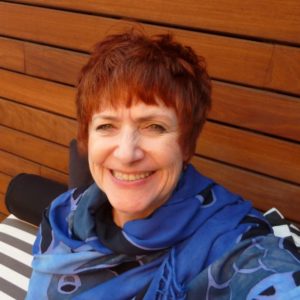By Nancy Haller, GCFPCM, MA, Feldenkrais® Assistant Trainer
When living with a brain injury there is a sense of loss and being lost. “What was” isn’t any longer and “what is” has little relationship to now. What a conundrum of experiences to fit into daily living as you develop the road map while you walk along on or off the path. Development of strategies is one tactic I found useful for moving through the daily tasks of home, work and family life.
As in an Awareness Through Movement® lesson, there are found and unfound options to movement patterns. We go through the lesson while piecing the individual movements into the greater and grander sequences. Blindly begin somewhere with hope as you move toward an end wading through a middle that is unexpected and praying there will be a pattern that makes sense. It all sounds vague and disjointed, and it is. Living in this post-injury space is disjointed.
Everything depends on what brain cells are working at any given time. Some are so damaged that they will never work again. Those who are experiencing these issues may not even realize they are having difficulties. Being blessed with compassionate family and friends makes the acknowledgment of difficulties palatable. It is not a simple process to notice the holes in your abilities. You don’t know what you don’t know.
There is a level of embarrassment to have to declare you have a brain injury. Many people have preconceived notions about what a brain injury is. There is general confusion about how many kinds of brain issues there are and the breadth of the effects on a person. How you are affected can be simple or extremely complex. Each person has individual and separate experiences that can change at a moment’s notice.
Some of the factors that create, change, and add to the difficulties include but are not limited to exhaustion from the lack of sleep, drugs, alcohol, chemical reactions, other sensitivities, and stress. In a long conversation with a doctor, it became clear to me that the lack of sleep was a huge factor in the ability to function. I was sleeping 4 to 5 hours a day and attempting to run marathons of chores all day. Change in this alone made a difference in my ability to complete tasks and have a better cognitive outcome. It took several months to modify my sleep patterns and add even a couple more hours of sleep.
The brilliance of our nervous system and neuroplasticity which allows the potential for new patterns to emerge sounds simple, until you are living with the necessity for this to happen in real time. Fumbling through the veils of actual life without being able to perform tasks that used to be simple and provided the foundation for your ease in life can become daunting. Patience and compassion are imperative in the process of transformation. Brain injuries are life-long. When brain scans are done, they can show the damage years later. It comes down to the ability to function every day.
When I give a lesson to someone with brain issues, my continual observation of their acceptance of the input of information, pace of lesson, level of exhaustion, and recognition of the time is imperative. I find value in spending time, prior to the lesson, to quiet my office environment, reflect on my choice in the prints or patterns of my clothing, and soften my own energy and physical being. I want to be in a space where I work without expectation or personal agenda. Careful consideration of the lesson chosen has to be relevant to the client’s present state. Together, a client and I discuss what they would like to be able to include in their living situation. It’s important to take time to discuss the value of pacing. Our need for resting is paramount: it is important to allow time for the brain to file the information.
Most people will have some type of brain issue in their life. The Feldenkrais Method is a tool to provide links to the hidden and lost places they encounter during the healing process. We will discuss those and more in my conference workshop in September. I will also review practical strategies that will make your life easier after a brain injury or help a loved one who had a brain injury.
About Nancy:
Nancy Haller is a teacher, speaker, and writer with a private practice in the Seattle area. In 1997, she completed her training as a Guild Certified Feldenkrais PractitionerCM and has been living with a brain injury since 2000. She has been able to return to near normal speech and daily function including a full practice by utilizing clear integration of the Feldenkrais® principles in her life. Working slowly and kindly within herself to assess, listen, and create differences every day to discover the present situation. Nancy brings her own personal story of recovering from brain injury and teaching others to find pathways to BrainEase in daily life in her book, “I Don’t Know How Long My Short-Term Memory Is”. Her website is https://nancyhaller.com/


